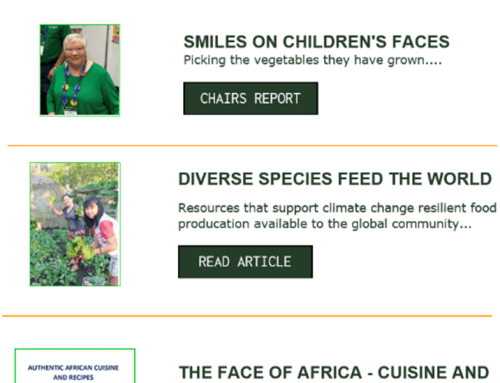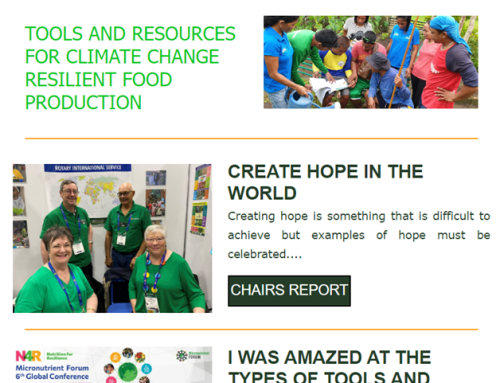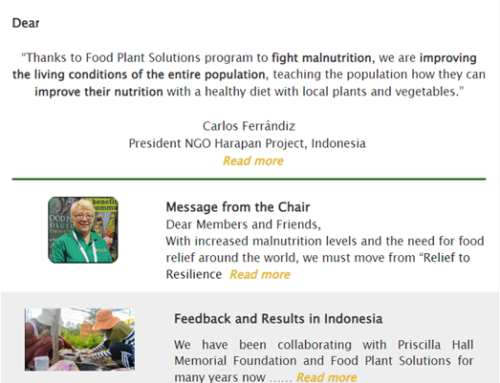Learn about our uniqueness, alongside articles written by some of our project partners, including World Vision South Sudan, in this edition.
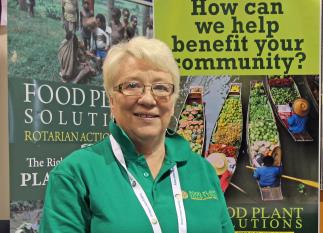
Message from the Chair
As I write the first message for the New Year, each Rotary Club around the world is celebrating “making a difference”, and welcoming the year where Rotary World President Barry Rassin, charges us all to “Be the Inspiration”.
As with all Rotary Conventions I have attended, I have come back reinvigorated by the amazing Rotarians and the projects going on all round the world that are making a difference.
Food Plant Solutions RAG has made a difference to many families, children and communities around the world this year. But, we could do so much more if we didn’t have to, as we say ‘yes’ to requests, wonder how we are going to raise the funds to create the publications. This year one of the important issues we need to address is to find a major sponsor. This is a major thrust in our Strategic Plan.
You, as Ambassadors for the RAG, could assist in this task. You could pass on to us names and contact details of people, businesses or Rotary clubs we could approach to become one of the sponsors. Please give this some thought in your busy days ahead. We would love to hear from you.
I am sure those of you that attended the convention will have passed your enthusiasm onto your friends in your clubs, and are excited about the year ahead. I know you will all try to “Be the Inspiration “in your club and community and around the world.
Please remember, “Every minute, of every day, 5 children under the age of 5 die from malnutrition”. Your support can help to change this.
Yours in Rotary Service.
PDG Una Hobday, Chair, Food Plant Solutions
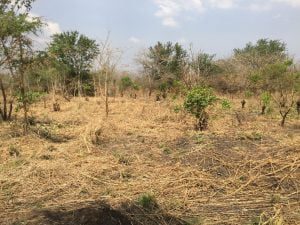
FPS and World Vision together in South Sudan
Dr Brian Hilton – World Vision Australia, Food Security Advisor
World Vision programs concentrate on increasing micronutrient availability through a food based approach to improved nutrition. Iron, vitamin A and zinc are the 3 most deficient nutrients world- wide. Anaemia is especially pervasive and persistent. Even Australia has significant iron deficiency.
World Vision is currently working with Food Plant Solutions in South Sudan to promote farming systems that include indigenous trees. This is a farming system that is less hard on the land than the “normal” slash and burn agriculture. World Vision uses a system called FMNR (Farmer Managed Natural Regeneration), which encourage the pruning of tree stumps to produce new trees, or for farmers to select existing trees for their nutritional or timber production and to leave these existing trees within the field. While these fields do not look like much in the dry season they are planted with crops at low intensity levels in the rainy season. They can be sustainably farmed without fertilizer for many years.
The manuals from Food Plant Solutions helps farmers to recognize and value trees within that farming system. The manuals provide information on the growth and cultivation of these indigenous trees, and it also gives farmers important nutrition information about the fruit, nuts, seeds, and leaves produced by those trees.
Diets in South Sudan are poor so any improvement in the consumption of indigenous fruit, pods, leaves and nuts can improve the nutritional status of women and children. Because of the lengthy war in South Sudan, many families have to rely on bush foods on a regular basis. With Food Plant Solutions guides farmers can better identify suitable bush foods and understand their nutritional values.
For more information: info@foodplantsolutions.org
YOU CAN SAVE A CHILD DYING FROM MALNUTRITION
- Make a donation – https://foodplantsolutions.org/donate/
- Introduce us to possible donors / sponsors.
- Start a program
- Include us in an existing program.
In 2018, children should not be dying from malnutrition – it is preventable.

An Increasing Population to Feed
Bruce French – Officer of the Order of Australia
The world population is increasing rapidly and is now put at 7.6 billion. Our planet hasn’t got any larger, so there is increasing pressure to produce food. One recent article on our ‘Western’ production system was bemoaning the fact that yield increases are increasingly hard to achieve. This is not surprising as we have narrowed the production system, pushed it to its limits, and then selected to produce bulk, creating a global crisis of obesity.
Thankfully, most major international reports are advocating the use of appropriate local plants grown using sustainable agro-ecological methods and highlighting their far superior nutritional value. There remains a tendency to still see the only hope for feeding the world being in highly technological and intensive production on large scale ‘Western’ or temperate zones feeding the world through export crops. But there is a more sound and sustainable method.
An average farm (72%) in the world today is less than one hectare and 92% of the world’s farms are smallholder properties under 5 hectares.
In some of the arid zones, firewood is at a premium. This can impinge on survival of trees and preservation of the soil. Again, simple adaptations of the cookers can significantly reduce firewood usage. A common fireplace cooking arrangement is made up of 3 large stones placed in a triangle. A cheap and easy to make (but more enclosed) cooker can reduce heat loss and therefore wood usage by up to 60%. Of the almost 2,000 edible species for arid zones, 600 species are trees and their loss for firewood can immediately impact food availability. And even with these tree species, 150 of the trees with edible parts that are suited to arid zones are legumes and their role in restoring nitrogen into the soil and producing higher protein edible portions is critical.
There still remains a mindset that believes irrigation is the answer to food production in arid areas. Water is such a scarce commodity in many regions, that women can spend hours each day carrying sufficient water to meet basic domestic needs. A more practical approach is the rigorous use of plant mulch to protect the soil, reduce evaporation and restore nutrients. I have seen this practice increase yields of basic staple foods by 4 or 5 times. As well, simple grey water filtration devices can be constructed to purify washing water to grow leafy greens.

Malnutrition in Guatemala
Michael Bakal – Co-founder Voces y Manos
Since 2008, Voces y Manos has worked in the community of Rabinal, Baja Verapaz, to promote youth leadership, health education, and girls’ education. In recent years, the community has experienced prolonged droughts that threaten the population’s ability to survive on subsistence agriculture.
Malnutrition has long plagued the country of Guatemala –46.5% of children under five suffer from chronic malnutrition, or low height for age (also known as “stunting”). To address this crisis, Voces y Manos and Food Plant Solutions are collaborating to address malnutrition. The aim of the project is not to introduce foreign plants, but rather build the capacity of the community to understand the nutritional value of plants that grow locally in their area, to effectively address malnutrition.
A feature that makes this project unique is that the primary implementers of the project will be young people, who will be trained to identify communities and individuals vulnerable to malnutrition; facilitate community consensus-building processes; and implement strategies to diversify crops, promote sustainable agricultural practices, and educate community members on the nutritional properties of native plants used in the project. By doing so, this project yields a triple benefit: families will be able to safeguard their health and nutrition, the environment will be protected, and young people (especially young women) will be equipped to be lifelong agents of change in their communities.
For further details please contact info@foodplantsolutions.org
FPS at Rotary Convention
PDG Una Hobday – Chair, Food Plant Solutions
On behalf of Food Plant Solutions RAG, I was fortunate to attend the Rotary convention in Toronto. What a fabulous convention it was where we celebrated the year when the theme was Rotarians “Making a difference”. At the booth I met some of our ambassadors and many dynamic Rotarians certainly making a difference.
I had the opportunity to speak with young Rotarians who are looking for a project to pass on to their Rotary Clubs. I met and spent time with a wonderful woman who is working with young women in jails in Colombia and wants to add a garden to this jail. She is looking at a global grant so I am sure you will hear more of this project as we assist with this application.
I met up with Rotarians from WA and from Mexico, one of whom has agreed to be part of our committee team and be the spokesperson for WA rotary clubs. I also attended the RAG annual meeting and a workshop, which was very worthwhile.
Why Food Plant Solutions is Unique
We approach aid quite differently to most aid organisations:
We’d like to cease to exist because we were no longer needed. Sadly, we are a long way from that.
We are very low cost. All general donations go solely towards the project.
We never send people in-country but instead form partnerships with existing aid providers who use our publications to educate communities, and particularly women and children, on the nutrient value of their local food plants. Most projects (whether they be housing, water, schools, maternal health, etc.), would be further enhanced by adding a Food Plant Solutions component to them. People who are in dire situations require a sustainable way to grow and access nutritious food.
Our approach is proven to work. We have seen program partners reduce malnutrition in children by as much as 95%.
We need your help to raise funds so that we can continue this work. We ask that you please share this email with your vast network of connections.
And, if you can, please donate now


